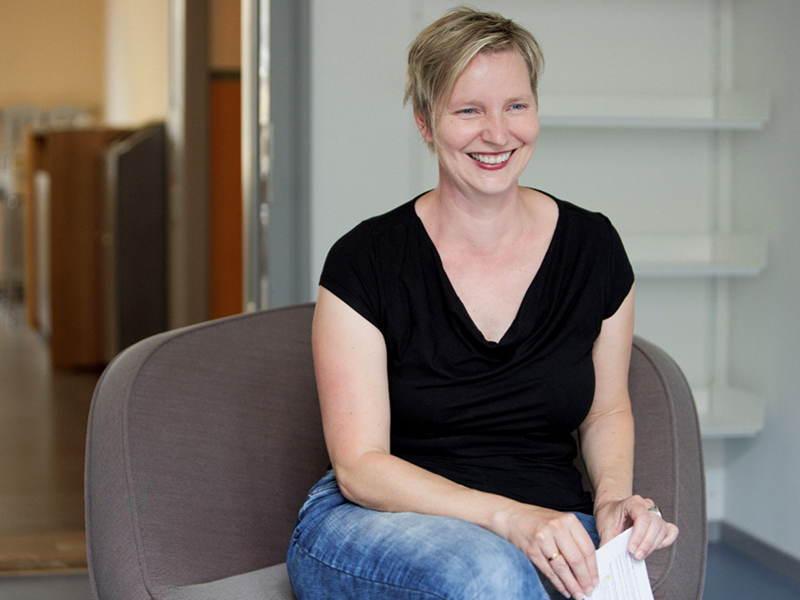Barbara Lischetti was the Gender Equality Officer and pioneer of the Interdisciplinary Centre for Gender Studies (IZFG) at the University of Bern. On the 20th anniversary of her death, Andrea Zimmermann talks about her legacy and the IZFG today.
Interview: Lilian Fankhauser and Muriel Scholl / Photography: Daniel Rihs
Read the original uniAKTUELL article here.

What part did Barbara Lischetti play in the founding of the IZFG in 2001?
Barbara Lischetti played a decisive role in the financing of the IZFG. Around 30 years ago, the University of Bern received so-called head bonuses for the appointment of women to professorships and, like most universities, it used these funds to promote equality for women. However, Lischetti was of the opinion that these funds should also be invested in women's and gender studies. With the support of several female professors, she was able to convince the university management in 2001 to finance a research centre with them, the IZFG.

Barbara Lischetti
was Head of the Department for the Advancement of Women (AFF), now the Equal Opportunities Department, and Equal Opportunities Officer at the University of Bern.
Nora Lischetti
Where does the IZFG stand today, 20 years later?
With around 40 employees from a wide range of disciplines, the IZFG brings together a wealth of expertise. It is a centre of excellence of national and international importance. Our main fields of activity are basic and mandate research - in particular for various federal offices and other universities, teaching as well as projects in the area of knowledge transfer and cooperation projects. The IZFG therefore has social significance and responds to current needs with innovative projects and relevant research, such as a project on women's health, which was carried out this year on behalf of the Federal Office of Public Health.
IZFG has been awarding the Barbara Lischetti Prize in her honour since 2014. What is honoured with this award?
Every two years, this prize honours outstanding dissertations that deal with a topic of gender studies or a current research approach in this field. I find this award very noteworthy because it continues Lischetti's commitment to the targeted promotion of gender research and because it emphasises the interface between gender equality work and gender research. Research into current gender relations, for example, is often a basis for taking effective measures to achieve greater gender equality: How exactly certain mechanisms of exclusion and inclusion work and which gender norms continue to block or pave the way for whom in which context.
On Memorial event for Barbara Lischetti you will be giving a lecture on 21 September entitled "Transforming gender relations, criticising hegemonic masculinity". What is it about?
This is the result of a five-year project in which we collaborated with a Swiss-wide research centre to investigate why so few women hold leadership positions at universities in subjects such as biochemistry and chemistry. Why is it that many women leave academia after completing their doctorate? In this context, people usually think about how young female scientists can be specifically supported. According to our findings, however, it is just as important to scrutinise the prevailing norms that are implicitly associated with masculinity: The image of the always-available, mobile, in no way connected genius scientist who lives exclusively for his research is highly problematic.
Why?
These ideas underlie many conscious and unconscious exclusions. However, resentment towards such a life model is increasing among young researchers as a whole. My input is not only about the obstacles, but also about solutions for overcoming or eliminating them, and how we can implement these solutions together with people from the field of gender equality. These are many necessary steps to make the field of science more inclusive.
Monitoring, i.e. the systematic observation of data, is an important element of your research. Could you please explain this in more detail?
The aim of our monitoring is to continuously collect gender and diversity-specific data in order to better analyse who has what scope for action. From this, we can derive measures for a fairer distribution, track developments and check whether the measures taken are having the desired effect. For example, we are currently developing a gender and diversity monitoring system for cultural organisations. We have already been looking at their gender ratios for some time, so that we can now take concrete steps towards the systematic and continuous collection of data with the first organisations.
However, diversity monitoring is much more complex due to the collection and secure management of sensitive data. When an actress or dancer is hired by a cultural organisation, no information is collected on their ethnic and social background. We still need to develop a number of s so that we can collect and analyse these aspects. Our aim is also to visualise multiple discrimination and thus the particular need for action for equality.
Complex issues such as gender and diversity must be considered together. What are your recommendations for addressing them structurally at universities?
Firstly, it is particularly important for me to emphasise that diversity and greater inclusion do not mean the opposite of quality. In research in particular, better quality results can be achieved when a phenomenon is analysed from different perspectives. This has been proven in numerous studies.
It is not only in Switzerland that the university is an institution that mainly white and therefore runs the risk of not including enough of certain perspectives. Universities must therefore not only ask themselves how they can promote women, but also how they can build their teams more diversely in order to become more accessible and inclusive as an institution in many ways. How can we conduct research together from different perspectives and with diverse knowledge? Self-reflection on the part of those responsible is important here, as the past has shown that important aspects are overlooked when a homogeneous group of people work on a question; as in the case of heart attacks, for example, which manifest themselves differently in men and women, or crash test dummies that have long been based on the standard dimensions of a male body. This is why research centres such as the IZFG with its diverse expertise are so relevant. They cover a very broad field and investigate a topic from different perspectives.
ABOUT THE PERSON
Andrea Zimmermann is a senior researcher at the Interdisciplinary Centre for Gender Studies (IZFG) at the University of Bern and conducts research on current social issues. She is currently leading the collaborative project "Gender and diversity monitoring in cultural institutions" and publishes on gender equality, emancipatory criticism, theatre and masculinities.
ABOUT THE INTERDISCIPLINARY CENTRE FOR GENDER RESEARCH IZFG
The IZFG is active in research, teaching and knowledge dialogue and deals with gender, gender issues and diversity in terms of content, methodology and theory. Founded in 2001, over 40 people from various disciplines work at the IZFG today. The interfaculty centre is headed by two female professors from the Faculty of Business, Economics and Social Sciences and the Faculty of Humanities and Social Sciences.